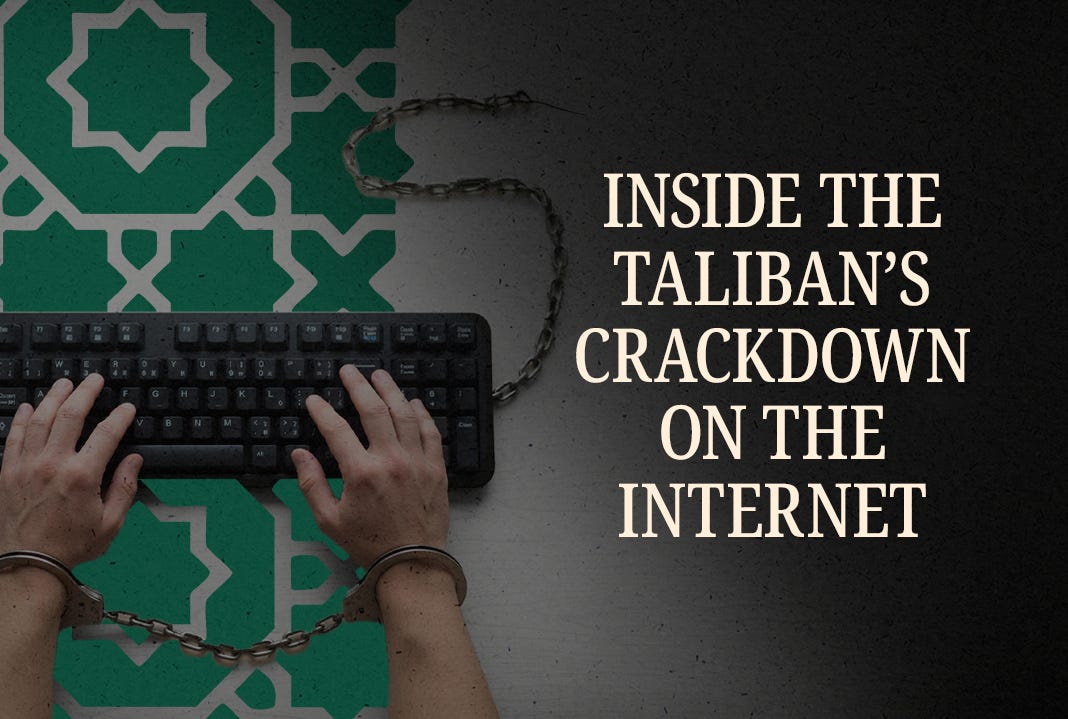Inside the Taliban’s Crackdown on the Internet
The Taliban’s sweeping Wi-Fi ban is cutting Afghans off from education, business, and the outside world, threatening to plunge the country into deeper isolation.
Earlier this week, the Taliban cut off Wi-Fi services in Afghanistan’s northern province of Balkh following a decree by their leader, Hibatullah Akhundzada. The ban, which began in Balkh, has now expanded to include Kunduz, Badakhshan, Baghlan, Takhar, Kandahar, and Herat, with more provinces expected to follow. The ban applies specifically to Wi-Fi provided through optical fiber connections, leaving mobile internet technically available. However, due to poor infrastructure and high costs, most regions are unable to rely on mobile internet as a practical alternative.
The Taliban leader ordered the governors of provinces to shut down the internet to prevent "immorality" and curb the use of the internet for online activities between men and women. However, many have called out against this order, including former United States Ambassador to Afghanistan Zalmai Khalilzad, calling it "absurd and unwise" and "damaging to the economy". Many civil society activists believe the decision is an attempt to block the flow of information about Taliban human rights abuses to the media and international community.
This latest move comes on the heels of other restrictions. Earlier this month, the Taliban barred more than 21 provinces from airing visual news on their local channels. Women working for United Nations offices in Afghanistan were banned from going to work, prompting global condemnation. Even YouTubers have been prohibited from filming street reports in Kandahar—a rare form of citizen journalism under Taliban rule.
In today’s world, the internet is a lifeline for business, education, and communication. Since August 2021, Afghans, especially women, have relied heavily on it to conduct business through social media shops, attend online classes, and access educational opportunities. Thousands of girls depend on online learning to continue their education. This ban threatens to cut off one of their last remaining avenues for progress. Without access to fiber connections, maintaining a stable and affordable internet connection is nearly impossible.
The consequences go beyond education. Women’s mental health is also at stake. Suicide rates among Afghan women have risen sharply since the Taliban takeover, driven by forced marriages, domestic violence, depression, and lack of support services. Social media provided an outlet for many women to share their thoughts, express their frustrations, and connect with others. Cutting off this connection could worsen the crisis. One bookstore owner told Middle East Uncovered, “I don’t know how I’m going to upload a video now,” citing mobile internet speeds of just 10–15 kbps. “I run my business online, and my traffic comes from the vlogs and reels I upload. How will I sell if I can’t advertise my products?”
Men and boys are also affected. Since 2021, thousands have lost their jobs at NGOs, media organizations, foreign companies, and private schools, many of which were shut down due to the exclusion of women. Some of these skilled individuals found freelance work online. Shams*, a freelance interpreter, explained that his job depends on a reliable internet connection. “I spend 6–8 hours a day answering calls for patients in the U.S. and Canada, interpreting their conversations with healthcare providers,” he said. “I have no idea how I will continue my work without a stable connection. Every time we think the Taliban’s oppression might stop, they find a new way to make our lives a living hell.”
Businesses that rely on the internet are also bracing for disruption. According to a source in Kabul’s 11th district intelligence committee, the shutdown will roll out in phases. Only certain institutions will be licensed to access fiber internet, and firewalls will be installed to slow mobile data speeds and restrict access to information.
The backlash has been significant. A delegation of Taliban officials reportedly traveled to Kandahar to persuade their leader to reconsider, but their efforts were unsuccessful. Even Saraj Uddin Haqqani publicly stated his disapproval of this decree, arguing that governance through force is neither sustainable nor possible. Even within the Taliban leadership, views regarding the shutdown of the internet remain a divisive issue.
Whether Afghanistan will become an isolated and disconnected state is not yet clear; however, the current trajectory doesn’t inspire much optimism. Urgent action is needed to ensure that Afghanistan’s 40 million citizens still have a voice. Devices like Starlink, VPNs, and the Mahsa Server can be a lifesaver at this crucial moment. Together, they can help the reporters, activists, and journalists continue documenting human rights abuses and Taliban oppression.
21-year-old Fatima* told Middle East Uncovered, “It feels like Afghanistan is falling into Taliban hands all over again, as if we are reliving 2021.”
The group’s efforts to silence and isolate the country have not only harmed its economy but also risk undoing two decades of progress toward a more open and sustainable Afghanistan. By undermining internet access, they threaten the survival of thousands of businesses and institutions that rely on connectivity. Even some Taliban leaders appear to recognize the severity of this mistake—but until their top leadership changes course, Afghanistan’s future remains at stake.
*Middle East Uncovered uses pseudonyms to protect our sources in Afghanistan.
Middle East Uncovered is powered by Ideas Beyond Borders. The views expressed in Middle East Uncovered are those of the authors and do not necessarily reflect the views of Ideas Beyond Borders.





Really great article. If possible, could you tell me how you found those sources for the article?